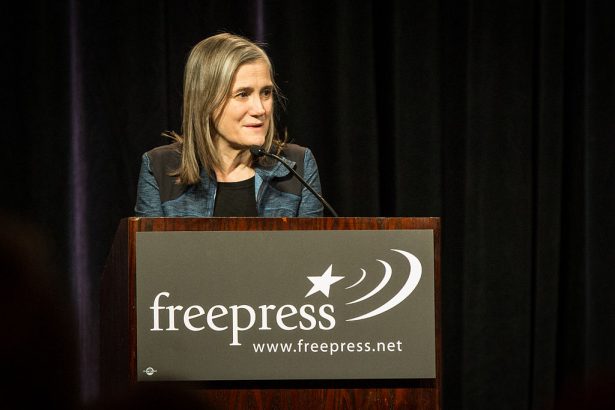The Crackdown on Dakota Access Pipeline Reporters Shows the Vital Role of Independent Media
MEDIA, 24 Oct 2016
Sarah Aziza | Waging Nonviolence – TRANSCEND Media Service

Democracy Now’s Amy Goodman at the 2013 National Conference for Media Reform in Denver, Colorado. (Wikipedia / Tony Webster)
19 Oct 2016 – Hundreds of activists have faced arrest since nonviolent demonstrations against the North Dakota Access Pipeline, or DAPL, began last spring. While clashes with law enforcement frequently coincide with public protest, the arrests of numerous independent journalists, including Democracy Now!’s Amy Goodman, have raised serious questions about state suppression, free speech and the blurring of lines between activism and journalism.
Goodman was arrested after she posted footage of contractors using physical force and guard dogs to repel unarmed protesters at the pipeline’s construction site. Her video was shot on September 3, before the protests had received significant coverage from major news outlets, and quickly went viral. Five days later, Goodman was informed that Morton County, North Dakota had issued a warrant for her arrest, charging her with “rioting.”
Goodman is not alone among journalists targeted recently for their coverage of nonviolent protests surrounding the pipeline. On October 11, documentary filmmaker Deia Schlosberg was arrested in Walhalla, North Dakota, while covering a demonstration of solidarity with the DAPL protesters. Charged with three counts of felony conspiracy, Schlosberg was held for 48 hours without a lawyer, while law enforcement confiscated her footage. She is facing a possible sentence of up to 45 years.
Meanwhile, independent media outlet Unicorn Riot has also seen four of its journalists arrested in recent months. The publication insists that the arrests were executed with the intent of disrupting reporting, saying, “All four reporters currently facing charges were actively engaged in reporting breaking news at the time, and would have continued documenting and broadcasting if not directly prevented from doing so by their arrests.” Actor and activist Shailene Woodley was also arrested at the protests on October 10, cutting short her live broadcast, which was streaming to 40,000 Facebook users.
These arrests have raised issues about the complex relationship between activism and journalism. Ladd Erickson, while prosecuting Goodman’s case for Morton County, tried repeatedly to undermine her legitimacy as a journalist, arguing that her proximity to the action rendered her culpable. “She’s a protester, basically,” he told the Grand Forks Herald. Yet many of his comments implied a political motivation for targeting Goodman’s reporting. “Everything she reported on was from the position of justifying the protest actions,” he added. Erickson had also attempted to prosecute Goodman under an earlier charge of trespassing, but was unable to proceed due to lack of evidence.
Many others have expressed alarm that such crackdowns may inhibit independent journalism in the future. Unicorn Riot organizers say this “clear pattern of arrests and criminal charges against many independent media … effectively guarantees the media have less resources to cover ongoing historical events.” Scholsberg argues that, at the time of her arrest, she was “doing her job” — documenting events — and that criminalizing reporters for bearing witness to breaking news undercuts the vital role of independent journalism. “Journalism needs to be passionately and ethically pursued and defended if we are to remain a free democratic country,” she said.
Scholsberg’s case is ongoing, but on October 17, District Judge John Grinsteiner rejected the “riot” charge leveled against Amy Goodman. Goodman celebrated the dismissal, calling it “a great vindication of the First Amendment.” She emphasized the need for journalists to “go to where the silence is,” and urged reporters to continue covering the pipeline.
________________________________________
Sarah Aziza is an Arab-American writer, graduate student and activist based in NYC. She has previously worked among refugee populations in North Africa, Jordan and the West Bank. Her areas of focus include immigration, human rights, international politics, feminism and mental health. She is a lover of the story-less-told. Find her on Twitter @SarahAziza1 or www.sarahaziza.com
Go to Original – wagingnonviolence.org
DISCLAIMER: The statements, views and opinions expressed in pieces republished here are solely those of the authors and do not necessarily represent those of TMS. In accordance with title 17 U.S.C. section 107, this material is distributed without profit to those who have expressed a prior interest in receiving the included information for research and educational purposes. TMS has no affiliation whatsoever with the originator of this article nor is TMS endorsed or sponsored by the originator. “GO TO ORIGINAL” links are provided as a convenience to our readers and allow for verification of authenticity. However, as originating pages are often updated by their originating host sites, the versions posted may not match the versions our readers view when clicking the “GO TO ORIGINAL” links. This site contains copyrighted material the use of which has not always been specifically authorized by the copyright owner. We are making such material available in our efforts to advance understanding of environmental, political, human rights, economic, democracy, scientific, and social justice issues, etc. We believe this constitutes a ‘fair use’ of any such copyrighted material as provided for in section 107 of the US Copyright Law. In accordance with Title 17 U.S.C. Section 107, the material on this site is distributed without profit to those who have expressed a prior interest in receiving the included information for research and educational purposes. For more information go to: http://www.law.cornell.edu/uscode/17/107.shtml. If you wish to use copyrighted material from this site for purposes of your own that go beyond ‘fair use’, you must obtain permission from the copyright owner.